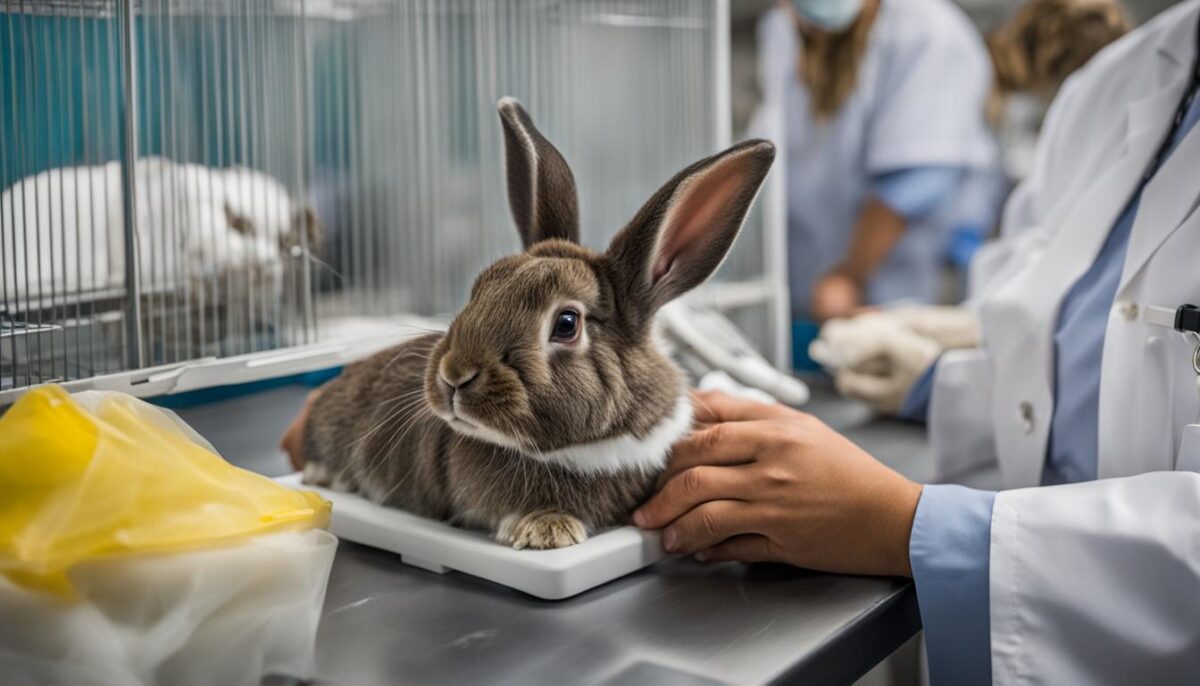Seizures in rabbits are a neurologic condition characterized by uncontrolled muscle contractions and changes in mental status. While seizures are uncommon in pet rabbits, they can be a medical emergency and potentially fatal. It is important for pet owners to seek veterinary attention as soon as possible after a seizure episode.
Common symptoms of seizures in rabbits include muscle twitches, convulsions, loss of balance, loss of consciousness, and involuntary urination or bowel movements. Seizures can be caused by various factors, including developmental abnormalities, metabolic disorders, nutritional deficiencies, infections, toxins, trauma, and heat stroke.
Diagnosis involves a physical examination, routine blood work, radiographs, and specialized testing if necessary. Treatment may involve managing the underlying cause, using medications to control seizures, and providing supportive care. The prognosis for seizures in rabbits depends on the underlying cause and the response to treatment. Prevention of seizures involves regular veterinary check-ups and providing optimal care for the rabbit’s overall health and well-being.
Key Takeaways:
- Seizures in rabbits can be potentially fatal and require immediate veterinary attention.
- Common symptoms of seizures in rabbits include muscle twitches, convulsions, and loss of consciousness.
- Seizures can be caused by various factors, including developmental abnormalities, metabolic disorders, and trauma.
- Diagnosis involves a physical examination, blood work, and specialized testing if necessary.
- Treatment may involve managing the underlying cause and using medications to control seizures.
What Are Seizures in Rabbits?
Seizures in rabbits are a neurologic condition characterized by uncontrolled muscle contractions and changes in mental status. They can range in severity and be accompanied by various symptoms, such as muscle twitches, convulsions, loss of balance, loss of consciousness, and involuntary urination or bowel movements. The most recognizable seizure is called grand mal, which involves full body tremors and loss of consciousness. However, seizures can also manifest as small muscle twitches or tremors without a loss of mental state. Seizures in pet rabbits are uncommon but can occur depending on the underlying cause.
During a seizure episode, pet owners should use caution and seek veterinary attention as soon as possible. It is important to note that it can take hours to days for a rabbit to return to normal behaviors after a seizure. Immediate post-seizure care involves keeping the rabbit quiet and safe to prevent further injury.
Causes of Seizures in Rabbits
Seizures in rabbits result from a neurologic problem within the brain, leading to abnormal and uncontrolled bursts of electrical or nerve activity. These abnormal bursts can be caused by various factors, including developmental abnormalities, metabolic disorders, nutritional deficiencies, infections, toxins, trauma, and heat stroke. Additionally, seizures can also occur without an identifiable cause, known as idiopathic epilepsy.
Understanding the underlying cause of seizures in rabbits is crucial for proper diagnosis and treatment. Veterinary professionals often begin the diagnostic process by ruling out other potential causes of seizure-like activity through physical examinations, routine blood work, radiographs, and specialized testing if necessary. This comprehensive approach helps ensure an accurate diagnosis and enables the development of an appropriate treatment plan.
It is important to note that the precise cause of seizures in rabbits may vary from case to case. Identifying the specific cause of seizures is essential for effective management and prevention of future episodes. By addressing the underlying cause and providing appropriate treatment, veterinarians can help reduce the frequency and severity of seizures in rabbits.

Potential Causes of Seizures in Rabbits
| Cause | Description |
|---|---|
| Developmental Abnormalities | Structural or functional abnormalities in the brain that occur during fetal development |
| Metabolic Disorders | Imbalances or abnormalities in the body’s metabolic processes, such as electrolyte imbalances or liver disease |
| Nutritional Deficiencies | Lack of essential nutrients, vitamins, or minerals necessary for proper neuronal function |
| Infections | Bacterial, viral, or parasitic infections that affect the brain or nervous system |
| Toxins | Ingestion or exposure to harmful substances that disrupt normal brain activity |
| Trauma | Head injuries or physical trauma that directly affect the brain |
| Heat Stroke | Overheating or prolonged exposure to high temperatures, leading to damage in the brain and nervous system |
| Idiopathic Epilepsy | Seizures without an identified cause, often seen in rabbits with a genetic predisposition |
Identifying and addressing the specific cause of seizures in rabbits is crucial for effective management and treatment. With proper veterinary care and ongoing monitoring, it is possible to minimize the impact of seizures and improve the overall well-being of rabbits affected by this neurologic condition.
Symptoms of Seizures in Rabbits
Symptoms of seizures in rabbits can vary, depending on the type and severity of the seizure. Common symptoms include muscle twitches or tremors, convulsions, loss of balance, loss of consciousness, involuntary urination or bowel movements, leg rigidity, leg paddling, unusual behavior, rolling, circling, head tilt, vocalization, and chewing at the air. These symptoms can be distressing to witness and can indicate a medical emergency in rabbits.
During a seizure episode, rabbits may experience muscle twitches or convulsions, causing their body to shake uncontrollably. They may also lose their balance, making it difficult for them to stand or move properly. Involuntary urination or bowel movements may occur due to the intense muscle contractions. Loss of consciousness is another symptom that can range from complete unconsciousness to a dazed or confused state. These symptoms usually last for a short duration, but it is crucial to seek veterinary attention if a rabbit experiences a seizure.
It is important for pet owners to be able to recognize these symptoms and seek veterinary attention if their rabbit experiences them. Seizures can be a sign of an underlying medical condition or neurologic problem that needs to be addressed. Early intervention and proper diagnosis are essential for providing appropriate treatment and improving the prognosis for rabbits with seizures.
The symptoms of seizures in rabbits can be distressing for both the rabbit and its owner. It is important to stay calm and ensure the safety of the rabbit during a seizure episode. Providing a quiet and safe environment can help prevent further injury. After the seizure, it is recommended to monitor the rabbit closely and contact a veterinarian to discuss the next steps in diagnosis and treatment.
Diagnosing Seizures in Rabbits
Diagnosing seizures in rabbits involves a comprehensive approach that combines observation, physical examination, and diagnostic tests. Veterinarians rely on their expertise and a range of tools to accurately diagnose the underlying cause of seizures in rabbits.
Physical Examination
The first step in diagnosing seizures is a thorough physical examination of the rabbit. The veterinarian will assess the rabbit’s overall health, looking for any signs of injury, abnormalities, or underlying conditions that could contribute to seizures. This examination helps rule out external factors and provides valuable insights into the rabbit’s general well-being.
Blood Work
Blood tests are a crucial component of the diagnostic process. They help identify potential underlying causes of seizures, such as metabolic disorders or nutritional deficiencies. The blood work may include a complete blood count, blood chemistry panel, and tests for specific infections or toxicities. By analyzing the blood work results, veterinarians can determine if there are any abnormalities that could be contributing to the seizures.
Radiographs and Specialized Testing
In some cases, veterinarians may recommend radiographs (X-rays) to evaluate the rabbit’s brain and detect any physical abnormalities or injuries that could be causing the seizures. Additionally, specialized testing such as MRI or CT scans may be necessary to provide more detailed information about the brain’s structure and function. These advanced imaging techniques can help identify tumors, lesions, or other serious conditions that could be responsible for the seizures.
Overall, the diagnostic process for seizures in rabbits involves a careful evaluation of the rabbit’s physical health, interpretation of blood work results, and potentially the use of radiographic or specialized testing. By combining these methods, veterinarians can accurately diagnose the underlying cause of seizures in rabbits, allowing for appropriate treatment and management strategies to be implemented.

Treatment of Seizures in Rabbits
Effective treatment of seizures in rabbits involves managing the underlying condition and providing seizure management strategies. The specific treatment approach depends on the underlying cause of the seizures and may involve anti-seizure medications to control and reduce the frequency of seizures. Additionally, supportive care should be provided to ensure the rabbit’s well-being during and after a seizure episode.
If the seizures are uncontrolled, hospitalization may be necessary to provide intravenous fluids, intravenous anti-seizure medications, and nutritional support. This allows for immediate intervention to prevent further complications and ensure the safety of the rabbit. It is important to address the underlying cause of seizures to effectively manage and prevent future episodes. This may involve antibiotics, steroids, non-steroidal anti-inflammatories, or anti-parasitic medications to address infections, inflammation, or other contributing factors.
Anti-seizure medications, such as phenobarbital, levetiracetam, or potassium bromide, may be prescribed by a veterinarian to control and reduce the frequency of seizures. These medications work by stabilizing the electrical activity in the brain and reducing the likelihood of seizure occurrence. Regular veterinary check-ups are important to monitor the rabbit’s response to treatment and make any necessary adjustments to the medication regimen.
| Treatment Approach | Description |
|---|---|
| Management of underlying condition | Addressing the specific cause of seizures, such as infections or inflammatory conditions, through appropriate medications and interventions. |
| Anti-seizure medications | Prescribing medications, such as phenobarbital, levetiracetam, or potassium bromide, to control and reduce the frequency of seizures. |
| Supportive care | Providing a safe and quiet environment for the rabbit during and after a seizure episode, ensuring the prevention of further injury. |
“The specific treatment approach for seizures in rabbits depends on the underlying cause and may involve anti-seizure medications, management of the underlying condition, and supportive care.”
Recovery and management of seizures in rabbits involve monitoring the rabbit after a seizure, providing a quiet and safe environment, and preventing further injury. It is crucial to closely observe the rabbit’s behavior and track the frequency of seizures to evaluate the effectiveness of treatment. In addition to medical interventions, optimizing the rabbit’s overall health through regular veterinary check-ups, routine blood work, and appropriate nutrition can help minimize the risk of seizures and improve the rabbit’s quality of life.
Rabbit Mortality from Seizures: Understanding the Fatal Consequences of Uncontrolled Seizures
Seizures in rabbits can have fatal consequences, especially when they are uncontrolled. These neurological episodes can cause significant damage to the brain, leading to severe complications and even death. It is crucial for pet owners to recognize the seriousness of seizures in rabbits and seek immediate veterinary care to prevent further harm.
During a seizure, the brain experiences abnormal electrical activity, resulting in uncontrolled muscle contractions and changes in mental status. If seizures go untreated or are poorly managed, they can cause irreversible damage to the brain tissue. This damage can disrupt vital bodily functions, leading to respiratory distress, organ failure, and ultimately, mortality.

Uncontrolled seizures in rabbits indicate an underlying issue that needs to be addressed. The severity and frequency of seizures, as well as the underlying cause, play a significant role in determining the prognosis. Therefore, it is essential for pet owners to work closely with their veterinarian to identify the underlying cause and develop a comprehensive treatment plan.
| Factors Contributing to Fatal Seizures in Rabbits | Preventive Measures |
|---|---|
| Uncontrolled seizure activity | Seek immediate veterinary care |
| Damage to brain tissue | Implement appropriate treatment and management |
| Respiratory distress and organ failure | Monitor rabbit closely after seizures |
| Underlying health conditions | Regular veterinary check-ups and optimal care |
Preventing mortality from seizures in rabbits requires a proactive approach that focuses on timely veterinary intervention, careful management of the underlying cause, and providing a safe and supportive environment for the affected rabbit. By working closely with a veterinarian and following their guidance, pet owners can help ensure the best possible outcome for their beloved rabbits.
Recovery and Management of Seizures in Rabbits
After a seizure episode, rabbits may experience a recovery period known as the post-ictal phase. During this phase, rabbits may exhibit abnormal behavior, disorientation, clumsiness, and tiredness. It is crucial to prioritize the rabbit’s safety by keeping them quiet and providing a safe environment to prevent further injury. Minimizing handling and allowing the rabbit to rest is essential during this time. Close monitoring of the rabbit’s behavior and tracking the frequency of seizures can help in managing their condition effectively.
Addressing the underlying cause of the seizures is crucial for the recovery and management of seizures in rabbits. Treatment options depend on the specific cause and may involve antibiotics, steroids, non-steroidal anti-inflammatories, or anti-parasitic medications. Anti-seizure medications, such as phenobarbital, levetiracetam, or potassium bromide, may also be prescribed to control seizures. However, it is important to note that preventing further seizures can be challenging due to the various causes. Regular veterinary check-ups, routine blood work, and providing optimal care for the rabbit’s overall health can help minimize the risk of additional seizures.
Preventing further seizures in rabbits requires a comprehensive approach that includes addressing potential triggers and providing optimal care. Pet owners should closely follow their veterinarian’s instructions, administer medications as prescribed, and maintain a supportive environment for the rabbit. This includes creating a stress-free living environment, ensuring a balanced diet, regular exercise, and monitoring for any changes in behavior or seizure activity. By focusing on the rabbit’s overall well-being and promptly addressing any concerns, pet owners can help minimize the risk of future seizures in their beloved rabbits.

Possible Triggers for Seizures in Rabbits:
- Developmental abnormalities
- Metabolic disorders
- Nutritional deficiencies
- Infections
- Toxins
- Trauma
- Heat stroke
Treatment Options:
Depending on the underlying cause, treatment options for seizures in rabbits may include:
- Addressing the underlying condition with appropriate medications
- Anti-seizure medications to control seizures
- Supportive care, including providing a quiet and safe environment
- Regular veterinary check-ups and monitoring the rabbit’s overall health
| Advantages of Regular Veterinary Check-ups | Optimal Care for Rabbits |
|---|---|
| Early detection of potential health issues | Proper diet and nutrition |
| Preventative measures against diseases | Regular exercise and mental stimulation |
| Prompt treatment of any underlying conditions | Stress-free living environment |
Conclusion
Seizures in rabbits can be a serious health issue that requires immediate veterinary care. While they may be uncommon in pet rabbits, seizures can have fatal consequences if left uncontrolled. It is crucial for rabbit owners to be aware of the symptoms of seizures and seek veterinary attention if their rabbit experiences any seizure activity.
Timely diagnosis, appropriate treatment, and ongoing management of the underlying cause are essential for the well-being of the rabbit. Regular veterinary check-ups, routine blood work, and providing optimal care for the rabbit’s overall health are vital in preventing and managing seizures. Pet owners should prioritize seizure awareness and understand the importance of seeking professional veterinary care.
Remember, seizures in rabbits should never be taken lightly. By taking proactive measures and working closely with a veterinarian, pet owners can ensure a healthy and happy life for their beloved rabbits, minimizing the risk of seizure-related complications and providing the best possible care for their furry friends.
FAQ
Can a rabbit die from a seizure?
Yes, seizures in rabbits can be potentially fatal, especially if they are uncontrolled. It is important to seek veterinary attention as soon as possible after a seizure episode to prevent further complications and ensure appropriate treatment.
What are seizures in rabbits?
Seizures in rabbits are a neurologic condition characterized by uncontrolled muscle contractions and changes in mental status. They can range in severity and be accompanied by various symptoms such as muscle twitches, convulsions, loss of balance, loss of consciousness, and involuntary urination or bowel movements.
What causes seizures in rabbits?
Seizures in rabbits can be caused by various factors, including developmental abnormalities, metabolic disorders, nutritional deficiencies, infections, toxins, trauma, and heat stroke. They can also be idiopathic, meaning that no underlying cause is identified.
What are the symptoms of seizures in rabbits?
Common symptoms of seizures in rabbits include muscle twitches or tremors, convulsions, loss of balance, loss of consciousness, involuntary urination or bowel movements, leg rigidity, leg paddling, unusual behavior, rolling, circling, head tilt, vocalization, and chewing at the air.
How do veterinarians diagnose seizures in rabbits?
Veterinarians diagnose seizures in rabbits through a combination of observation, physical examination, and diagnostic tests. This may include routine blood work, radiographs, and specialized testing if necessary to rule out other potential causes of seizure-like activity.
What is the treatment for seizures in rabbits?
Treatment for seizures in rabbits involves managing the underlying cause and providing supportive care. This may include addressing infections or inflammation with medications, using anti-seizure medications to control seizures, and providing intravenous fluids and nutritional support if necessary.
Can a rabbit die from a seizure?
Uncontrolled seizures in rabbits can be potentially fatal. It is important to seek veterinary attention as soon as possible to prevent further complications and ensure appropriate treatment.
How can seizures in rabbits be managed and prevented?
Recovery and management of seizures in rabbits involve addressing the underlying cause and providing appropriate treatment. Preventing further seizures can be challenging due to the various causes, but regular veterinary check-ups, routine blood work, and providing optimal care for the rabbit’s overall health can help minimize the risk.
What is the conclusion on seizures in rabbits?
Seizures in rabbits are a significant health concern that requires prompt veterinary attention. It is important for pet owners to be aware of the symptoms and seek veterinary care if their rabbit experiences any seizure activity. Regular veterinary check-ups, routine blood work, and providing optimal care can help prevent and manage seizures in rabbits, ensuring a healthy and happy life for these beloved pets.


